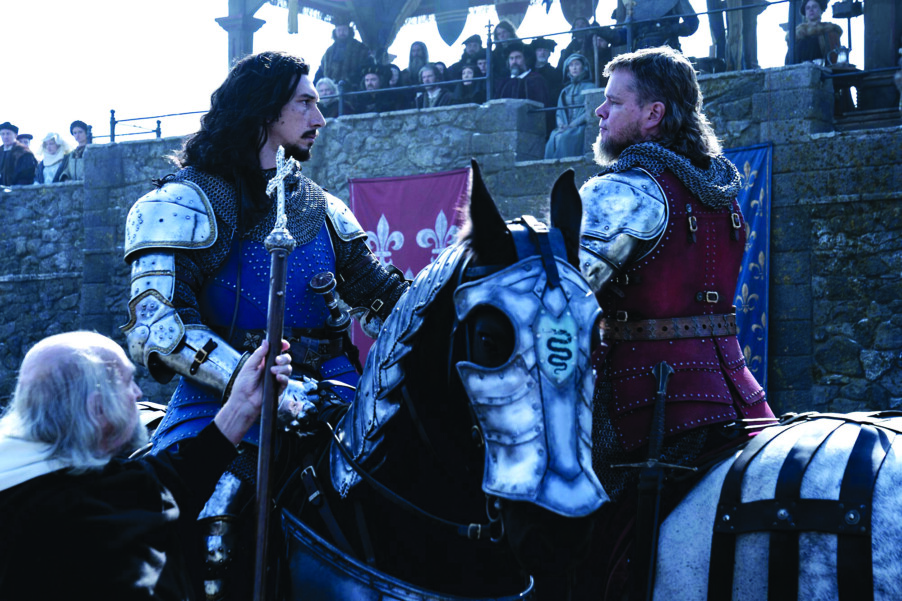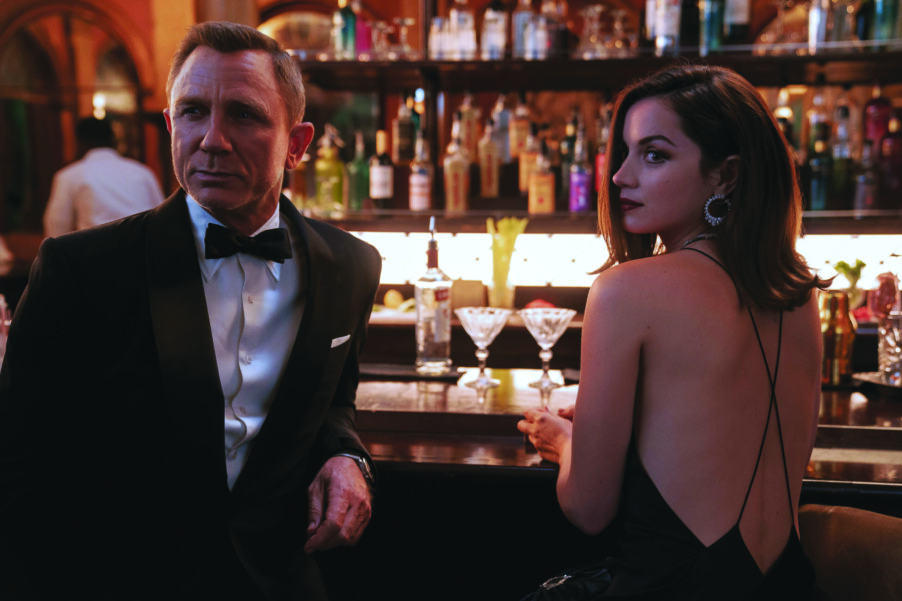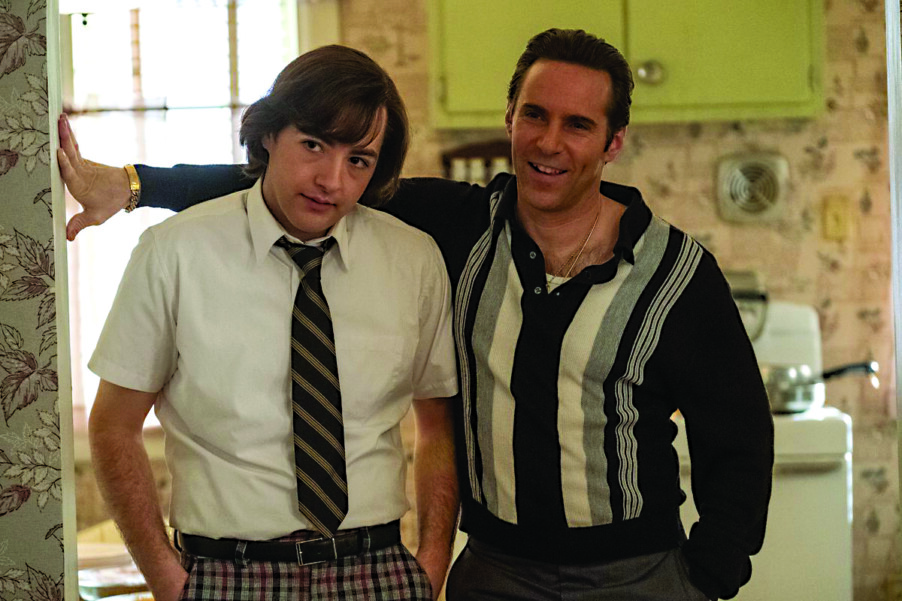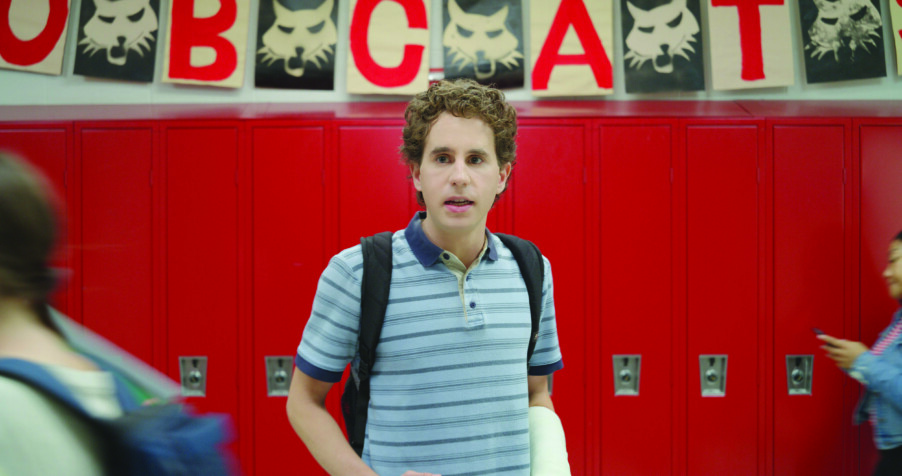Dune (PG-13)
An interplanetary empire is set on the road to war in Dune, which a title card rather optimistically calls “part one.”
And just to set the scene for my Dune experience: I’ve neither read any of the books nor watched any of the previous Dune movies or TV series. So I am coming in fresh to this universe.
As the movie opens, an unseen emperor of the known universe orders a family/political entity known as House Atreides to take control of a planet called Arrakis, a desert planet that is the only known source of a substance called spice. Spice facilitates interstellar travel, er, somehow and has psychotropic qualities. It is super valuable, which is why House Harkonnen, the previous rulers of Arrakis, are pretty peeved at having Arrakis taken out of their control. But the House Harkonnen head, Baron Vladimir Harkonnen (Stellan Skarsgard in a fat suit that seems to also allow him to float), thinks that this is just the emperor’s way of taking both Atreides and Harkonnen down a few pegs, since he knows this move will lead to war between the two houses.
Duke Leto Atreides (Oscar Isaac) knows all this, but he has plans for Arrakis, plans that involve working with the Fremen, the oppressed local people of Arrakis. When he shows up at the planet with his family — including concubine Lady Jessica (Rebecca Ferguson) and son and heir Paul (Timothée Chalamet) — he is ready for danger but hoping for peace. Jessica, a member of some kind of magic-y lady religious order, has abilities including getting people to do what she says when she sort of Jedi-forces them using a power called the Voice. She has been training Paul to use similar abilities and has plans for him beyond just having him take over for his father one day.
Paul, in the tradition of all raw Luke Skywalker/Hamlet types, isn’t quite sure what he wants, but he has some inkling of what might be in his future due to dreams he has, many featuring Chani (Zendaya), whose glowy blue eyes identify her as one of the Fremen.
To some extent everything I’ve said here is just setup. The movie follows the Atreideses as they move onto Arrakis and what happens next. We meet Atreides warrior-types Duncan Idaho (Jason Momoa) and Gurney Halleck (Josh Brolin). We also meet Fremen-associated people like Stilgar (Javier Bardem) and Dr. Liet-Kynes (Sharon Duncan-Brewster). There are a lot of characters here with a lot of stories and “serves as the this for that group.” There is also a fair amount of explaining this universe and of getting all the pieces in place. This feels like “Season 1” of a Game of Thrones-type show, getting us all set up for a multi-season story arc.
And what a beautiful-looking and -sounding series that would be. Dune looks absolutely gorgeous. Every scene is visually perfect — lighting, set design, costuming, colors, camera angles. The dust-filled wind, the helicopters that look like insects. The movie is generally in muted tones but there are accents of bright color — many from story-significant elements, like the personal shields people wear that turn blue when impacted or the bright eyes of the Fremen. Nearly every shot of this movie is visually arresting (which, because this movie is on HBO Max through Nov. 21 as well as in theaters, you actually can press pause and gaze to your heart’s content).
The movie also sounds great. The score (by Hans Zimmer) is majestic — underlining bigness, vastness and importance when needed. It is haunting and when mixed with the human voices that are often whispery or at a throat-singing deepness or sometimes both the whole effect is kind of awe-inspiring.
So A+ work on all that.
My question about this movie is does all this loveliness weigh it down? Is that why this movie feels so slow and inert? Every one of these beautiful scenes has a kind of “walking through hip-deep water” pacing, as though the speed isn’t quite on slow-mo but is, like, halfway there. (I mean, there is slow-mo, lots of slow-mo, but even the regular- mo feels pretty languorous.) Even though the movie has battle scenes and plenty of action, it never feels like it’s truly energized. There is a half-asleep, still-need-my-coffee feel to everything.
Which puts the performances somewhere in between the down-to-the-smallest-detail impressiveness of the look and sound of this movie and the baffling, frequently boring pacing (another good thing about seeing this movie on streaming: you can go back and see what you missed if you fall asleep halfway through; I didn’t but awakeness did not come without struggle). Isaac, Ferguson and Chalamet are fine, even compelling and engrossing in moments. But they don’t quite escape the sleepiness around them, nor does Brolin, who feels more regular-speed but doesn’t get enough screen time to make a difference. Momoa also brings a kind of liveliness to things but again isn’t around nearly enough.
The strange result of all of this is a movie where everything about Dune — even the prospect of a sequel and the continuing story and the internet rabbithole I disappeared to reading the Wikipedia for the Dune books — is more interesting than the act of sitting through the movie itself. It is definitely worth a watch and it is definitely boring. I ended the movie not really caring about any particular character or storyline but absolutely fascinated by the movie as an art object. What kind of recommendation is that, you ask? Beats me — a shaky B?
Rated PG-13 for sequences of strong violence, some disturbing images and suggestive material, according to the MPA on filmratings.com. Directed by Denis Villeneuve with a screenplay by Jon Spaihts and Denis Villeneuve and Eric Roth (based on, according to Wikipedia, the first half of the book by Frank Herbert), Dune is two hours and 35 minutes long and distributed by Warner Bros. In theaters and on HBO Max until Nov. 21.
Ron’s Gone Wrong (PG)
A benignly evil tech company heightens children’s sense of loneliness and their ability to bully each other via sleek new devices in Ron’s Gone Wrong, a pretty depressing read on the real world that is sort of cuted up with animation and a funny robot.
Barney (voice of Jack Dylan Grazer) feels very much like the odd kid out at his middle school: his family home is tended Old Worldily by his Bulgarian grandma Donka (voice of Olivia Coleman), his widowed dad Graham (voice of Ed Helms) is desperately busy trying to sell novelty items via Zoom, Barney’s various science-y interests (including rocks) have him branded as a bit of a nerd and, most deadly of all, he does not own a B*Bot, the hot new tech that all the other kids at school have. The B*Bot is part robot, part iPhone, part parental nightmare — all in kind of an EVE from Wall-E package. The B*Bots upload all available digital information about the child user and then “know” everything about them and can help them meet other kids who have the same interests. In addition the B*Bot follows the child everywhere, can dance with the kid, take the kid on immersive virtual reality adventures and take constant photos and videos to post to the kid’s various social media pages and instantly ask for likes and follows from surrounding kids.
Because I am an Old, this all seems like a dystopic hellscape that we are probably six months away from here in the real world. But to Barney, the B*Bot, promising to be your “best friend out of the box,” is the sole object of his birthday desires. With B*Bot, he hopes, he will have a robot friend and maybe finally be able to make some connections with human friends too.
Unfortunately for Barney, Graham is both clueless and light on cash, so at first he doesn’t get Barney the desired bot. But after seeing him pranked by some bullies, Graham runs down to the B*Bot store, offering money and Donka’s goat in trade for a new B*Bot. The store turns him away, but in the loading area he meets a delivery driver who has a damaged B*Bot he’s willing to sell off the books.
When Barney meets the B*Bot he eventually calls Ron (voice of Zach Galifianakis), he’s initially delighted. But then he realizes Ron is off — he doesn’t have all of the B*Bot operating system, can’t seem to access the network and has only uploaded the “A” section of his system’s encyclopedia, which is why he starts off calling Barney Absalom. On the way to the B*Bot store to return Ron, Barney discovers that no operating system also means no safety controls and that Ron is quite effective at fending off bullies. Once corporate — in the form of a hoodie-wearing CEO guy named Marc (voice of Justice Smith) and a Tim-Cook-ish-looking older guy named Andrew (voice of Rob Delaney) — finds out about the rogue bot, they seek to capture him, but Barney, who teaches Ron how to do his friend duties, feels like he’s finally found someone to connect with.
My biggest problem with this movie (and this may be a mild spoiler) is that in the end, the omnipresent tech company spreading unhappiness throughout the land of tweens and teens isn’t the problem, it’s that their device isn’t, like, authentic enough or some techy meta-verse garbage. And if that sounds all “get your Instagram off my lawn” that’s a completely fair criticism of my social media mindset but also the suggestion that just some algorithm tweaks would make social media full of joy feels pretty cynical (which is particularly odd as Andrew’s cynicism about the purpose of B*Bots ultimately being selling kids stuff is one of the movie’s examples of his villainy). I understand the realities of the world, but that doesn’t mean I have to pay money to have my kids watch a movie with the message that what they really need is better social media and a more unpredictable robot.
I suppose if you put all of that aside, sure this movie is cute. Ron is a fun character, who, because his mission is friendship-based, the movie uses to explain the essence of friendship. Being friends isn’t just about people listening to you (or heart-click liking your posts) but is a relationship two people are in together, choosing to be friends and be there for each other. When compared to the more transactional nature of how the movie presents social media friendships (you make content and the other person follows you and they’re your “friend” and then you both move on to making new “friend” connections), the examination of friendship as an organic thing that needs continuous tending is interesting. And it’s presented in a tween/young teen-understandable way. And there are robot-y hijinxs and funny goat bits and kid social politics, played for gentle laughs. I don’t know that this movie would hold the attention of a younger audience but maybe for kids around 8 and up, who are starting to think about the nature of friendships and have some knowledge of the social media world and can deal with some scenes of conversation, Ron’s Gone Wrong is fun enough to keep them engaged. Me, I’ll be over here on my lawn, telling the B*Bots to shoo. C+
Rated PG for some rude material, thematic elements and language, according to the MPA on filmratings.com. Directed by Sarah Smith and Jean-Philippe Vine and co-directed by Octavio E. Rodriguez with a screenplay by Peter Baynham and Sarah Smith, Ron’s Gone Wrong is an hour and 46 minutes long and distributed by Twentieth Century Studios in theaters (with at least a 45-day theatrical exclusivity window, according to BoxOfficePro).
FILM
Venues
AMC Londonderry
16 Orchard View Dr., Londonderry, amctheatres.com
Chunky’s Cinema Pub
707 Huse Road, Manchester; 151 Coliseum Ave., Nashua; 150 Bridge St., Pelham, chunkys.com
The Flying Monkey
39 Main St., Plymouth
536-2551, flyingmonkeynh.com
O’neil Cinemas
24 Calef Hwy., Epping
679-3529, oneilcinemas.com
Park Theatre
19 Main St., Jaffrey
theparktheatre.org
Red River Theatres
11 S. Main St., Concord
224-4600, redrivertheatres.org
Regal Fox Run Stadium 15
45 Gosling Road, Newington
regmovies.com
Rex Theatre
23 Amherst St., Manchester
668-5588, palacetheatre.org
Wilton Town Hall Theatre
40 Main St., Wilton
wiltontownhalltheatre.com, 654-3456
Shows
• Howl’s Moving Castle (PG, 2004) at Cinemark Rockingham Park, AMC Methuen and Regal Fox Run on Thursday, Oct. 28, at 7 p.m.
• Beetlejuice (PG, 1988) part of the Film Frenzy $5 Classics series at O’neil Cinemas in Epping with daily screenings through Thursday, Oct. 28.
• The Phantom of the Opera (1925), a silent film starring Lon Chaney, with live musical accompaniment by Jeff Rapsis, on Wednesday, Oct. 27, at 7 p.m at Park Theatre. Admission $12.
• The Thing (1982) screening on Thursday, Oct. 28, at 7 p.m. at Red River Theatres.
• Nosferatu (1922), a silent film, Thursday, Oct. 28, at 7:30 p.m. at the Rex, featuring live musical accompaniment by Jeff Rapsis. Admission costs $10.
• The Shining (R, 1980) on Friday, Oct. 29, at 2 & 6:30 p.m. at Red River Theatres in Concord.
• A Nightmare on Elm Street 3: Dream Warriors (R, 1987) on Friday, Oct. 29, at 2:30, 5 and 7:30 p.m. at Red River Theatres.
• The Blackbird (1921), a silent film with live musical accompaniment by Jeff Rapsis, at Wilton Town Hall Theatre on Friday, Oct. 29, at 7:30 p.m. Admission is free; $10 donation suggested.
• The Innocents (1961) at Wilton Town Hall Theatre on Friday, Oct 29, and Saturday, Oct. 30, at 7:30 p.m.
• The Invisible Man (1933) and The Wolf Man(1941) on Saturday, Oct. 30, at 1 p.m. at AMC Londonderry, Cinemark Rockingham Park and Regal Fox Run.
• The Witches (PG, 1990) on Saturday, Oct. 30, at 1, 4 & 7 p.m at Red River Theatres.
• Outside the Law (1920) and The Unholy Three (1925), silent films directed by Tod Browning and starring Lon Chaney, with live musical accompaniment by Jeff Rapsis, at Wilton Town Hall Theatre on Saturday, Oct. 30, 2 p.m. Admission is free; $10 donation suggested.
• Abbott and Costello Meet Frankenstein (1948) at Wilton Town Hall Theatre on Saturday, Oct. 30, at 2 p.m.
• Psycho (R, 1960) on Saturday, Oct. 30, 2, 5 & 8 p.m. at Red River Theatres in Concord.
• The Exorcist (R, 1973) on Sunday, Oct. 31, at 2 & 5:15 p.m. at Red River Theatres.
• Where East Is East (1929) a silent film with live musical accompaniment by Jeff Rapsis, at Wilton Town Hall Theatre Sunday, Oct. 31, at 2 p.m. Admission is free; $10 donation suggested.
• Night of the Living Dead(1968) on Sunday, Oct. 31, at 1:30 & 4:30 p.m. at Red River Theatres in Concord.
Lon Chaney Weekend
Wilton Town Hall Theatre (40 Main St. in Wilton; wiltontownhalltheatre.com, 654-3456) will present a series of silent films starring Lon Chaney and featuring live musical accompaniment by Jeff Rapsis this weekend. On Friday, Oct. 29, at 7:30 p.m. catch The Blackbird (1921). On Saturday, Oct. 30, the lineup features Outside the Law (1920) and The Unholy Three (1925), starting at 2 p.m. On Sunday, Oct. 31, see Where East Is East (1929) at 2 p.m. Admission to all films is free; a $10 donation is suggested.
Featured photo: Dune. Courtesy photo.






